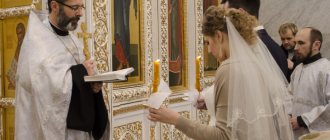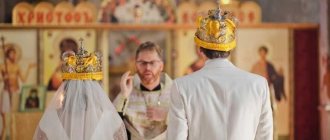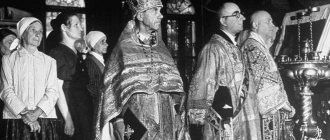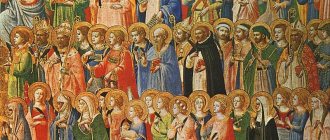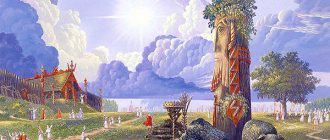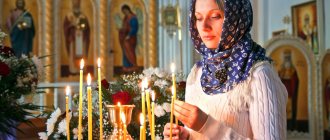The issue of religion is discussed and studied in every state and society. In some places it is especially acute and is quite conflicting and dangerous, in others it is more like small talk in free time, and in others it is an occasion to philosophize. In our multinational society, religion is one of the most pressing issues. Not every believer is well aware of the history of Orthodoxy and its origins, but when asked about Orthodoxy, we will all answer unequivocally that Orthodoxy is the Christian faith.
The emergence and development of Orthodoxy
Many scriptures and teachings, both ancient and modern, report that the Orthodox faith is true Christianity, citing their arguments and historical facts. And the question – “Orthodoxy or Christianity” – will always worry believers. But we will talk about accepted concepts.
Christianity is the largest form of social consciousness in the world, preaching the life path and teachings of Jesus Christ. According to historical data, Christianity arose in Palestine (part of the Roman Empire) in the 1st century.
Christianity was widespread among the Jewish population, and subsequently gained more and more recognition among other peoples, the so-called “pagans” at that time. Thanks to educational and propaganda activities, Christianity spread beyond the Roman Empire and Europe.
One of the ways of development of Christianity is Orthodoxy, which arose as a result of the division of churches in the 11th century. Then, in 1054, Christianity was divided into Catholicism and the Eastern Church, and the Eastern Church was also divided into several churches. The largest of them is Orthodoxy.
The spread of Orthodoxy in Rus' was influenced by its proximity to the Byzantine Empire. From these lands, the history of the Orthodox religion begins. Church power in Byzantium was divided due to the fact that it belonged to four patriarchs. The Byzantine Empire disintegrated over time, and the patriarchs uniformly headed the created autocephalous Orthodox churches. Subsequently, autonomous and autocephalous churches spread to the territories of other states.
The fundamental event in the formation of Orthodoxy in the lands of Kievan Rus was the baptism of Princess Olga in 954. This later led to the baptism of Rus' - 988. Prince Vladimir Svyatoslavovich called all the inhabitants of the city, and a baptism ceremony was performed in the Dnieper River, which was performed by Byzantine priests. This was the beginning of the history of the emergence and development of Orthodoxy in Kievan Rus.
The active development of Orthodoxy in Russian lands has been observed since the 10th century: churches, temples are being built, and monasteries are being created.
Plants
As we know, before the creation of animals, plants were created. This is the fourth day.
There is a lot of evidence that the first plants were huge. The earth gave birth to everything in large volumes. So mosses and algae grew so huge that they were many times higher than the height of the current trees.
As with dinosaurs, plants changed their appearance over a period of time. This was facilitated by climate change in the environment.
God was preparing the planet for the appearance of man. And by His order, everything that He considered necessary changed. These are the ideas about the creation of the world, according to Christian beliefs.
Principles and morals of Orthodoxy
Literally, “Orthodoxy” is correct glorification, or correct opinion. The philosophy of religion is the belief in one God, the Father, the Son and the Holy Spirit (God the Trinity).
The foundation in the doctrines of Orthodoxy is the Bible or “Holy Scripture” and “Holy Tradition”.
The connection between the state and Orthodoxy is quite distributed and understandable: the state does not make adjustments to the teachings of the church, and the church does not aim to control the state.
All principles, history, and laws are unlikely to be present in the thoughts and knowledge of every Orthodox person, but this does not interfere with faith. What does Orthodoxy teach at the philistine level? The Lord is the bearer of supreme intelligence and wisdom. The teachings of the Lord are irrefutably true:
- Mercy is trying to alleviate the sorrows of an unhappy person on your own. Both sides need mercy - the giver and the receiver. Mercy is helping those in need, a deed pleasing to God. Mercy is kept secret and not spread. Also, mercy is interpreted as loaned to Christ. The presence of mercy in a person means that he has a good heart and is morally rich.
- Perseverance and vigilance - consists of spiritual and physical strength, constant work and development, vigilance for good deeds and serving God. A persistent person is one who brings any task to the end, walking hand in hand with faith and hope, without losing heart. Keeping the Lord's commandments requires work and perseverance. Human kindness alone is not enough to spread goodness; vigilance and perseverance are always necessary.
- Confession is one of the Lord's sacraments. Confession helps to receive the support and grace of the Holy Spirit, strengthens faith. In confession, it is important to remember each of your sins, tell and repent. The one who listens to confession assumes the responsibility of forgiveness of sins. Without confession and forgiveness, a person will not be saved. Confession can be considered a second baptism. When committing sins, the connection with the Lord given at baptism is lost; during confession, this invisible connection is restored.
- The Church – through teaching and preaching, presents the grace of Christ to the world. In the communion of his blood and flesh, he unites man with the creator. The Church will not leave anyone in grief and misfortune, will not reject anyone, will forgive the repentant, will accept and teach the guilty. When a believer passes away, the church will not abandon him either, but will pray for the salvation of his soul. From birth to death, throughout life, in any situation, the church is nearby, opening its arms. In the temple, the human soul finds peace and tranquility.
- Sunday is a day of serving God. Sunday must be revered sacredly and the works of God done. Sunday is a day when you should leave everyday problems and everyday fuss and spend it with prayer and reverence for the Lord. Prayer and visiting the temple are the main activities on this day. You need to beware of communicating with people who like to gossip, use foul language, and tell lies. Anyone who sins on Sunday aggravates his sin 10 times.
Reptiles
When it comes to God's creation of the world, people like to remember dinosaurs. They say they lived an entire era, and the Bible talks about days.
But believers will object that with God a thousand years are like one day. And a day is like a thousand years. The Age of Dinosaurs fully corresponds to this statement. And by the fifth day we mean not a daily cycle, but an entire era.
After all, by and large, mythical dragons are the same dinosaurs. They have survived to this day. They just don't look so scary. For example, a crocodile is a reptile, but it is distantly related to fossil ancestors, because dinosaurs inhabited not only land. They flew through the air and lived in the water. And all reptiles, in general, came from them. They just changed over time.
What is the difference between Orthodoxy and Catholicism?
Orthodoxy and Catholicism have always been close to each other, but at the same time, fundamentally different. Initially, Catholicism is a branch of Christianity.
Among the differences between Orthodoxy and Catholicism, the following can be highlighted:
- Catholicism professes that the Holy Spirit comes from the Father and the Son. Orthodoxy professes that the Holy Spirit comes only from the father.
- The Catholic Church accepts the main position in religious education leading to the fact that the mother of Jesus, Mary, was not touched by original sin. The Orthodox Church believes that the Virgin Mary, like everyone else, was born with original sin.
- In all matters of faith and morals, Catholics recognize the primacy of the Pope, which Orthodox believers do not accept.
- Adherents of the Catholic religion make gestures describing the cross from left to right, adherents of the Orthodox religion do the opposite.
- In Catholicism, it is customary to commemorate the deceased on the 3rd, 7th and 30th day from the day of death, in Orthodoxy - on the 3rd, 9th, 40th.
- Catholics are ardent opponents of contraception; Orthodox Christians accept some of the types of contraception used in marriage.
- Catholic priests are celibate; Orthodox priests are allowed to marry.
- The sacrament of marriage. Catholicism rejects divorce, but Orthodoxy allows it in some individual cases.
Social relations
There is no understanding of what religion is. Religion in social relations is an issue that needs a lot of work. And, in fact, there is no one to lead it.
The godless seventy years were not in vain. There were only three theological seminaries in the Soviet Union. These are Moscow, Leningrad and Odessa. There was a decree among the clergy, which was not advertised: to take there only those students who were “especially” distinguished by their merits. And we are talking about bad differences. Losers and hooligans were then students of theological seminaries.
And what kind of positive social attitude can we talk about? Although, oddly enough, the Orthodox Church stayed afloat. Despite the clear desire of the authorities to destroy it and “show the last priest on TV.”
Coexistence of Orthodoxy with other religions
Speaking about the relationship of Orthodoxy to other religions, it is worth emphasizing such traditional religions as Judaism, Islam and Buddhism.
- Judaism. The religion is exclusively of the Jewish people. It is impossible to belong to Judaism without Jewish origin. For a long time, the attitude of Christians towards Jews has been quite hostile. Differences in understanding the person of Christ and his story greatly divide these religions. Repeatedly, such hostility led to cruelty (Holocaust, Jewish pogroms, etc.). On this basis, a new page began in relations between religions. The tragic fate of the Jewish people forced us to reconsider our relationship with Judaism, both at the religious and political levels. However, the general basis is that God is one, God the Creator, a participant in the life of every person, which today helps such religions as Judaism and Orthodoxy to live in harmony.
- Islam. Orthodoxy and Islam also have a difficult history of relationship. Prophet Muhammad was the founder of the state, military leader, and political leader. Therefore, religion is very closely intertwined with politics and power. Orthodoxy is a free choice of religion, regardless of nationality, territoriality and language a person speaks. It should be noted that in the Koran there are references to Christians, Jesus Christ, the Virgin Mary, these references are respectful and respectful. There are no calls for negativity or blame. At the political level, there are no conflicts of religions, but this does not exclude confrontations and hostility in small social groups.
- Buddhism. Many clergy reject Buddhism as a religion because it has no understanding of God. Buddhism and Orthodoxy have similar features: the presence of temples, monasteries, prayers. It is worth noting that the prayer of an Orthodox person is a kind of dialogue with God, who appears to us as a living Being from whom we expect help. A Buddhist's prayer is more of a meditation, a reflection, an immersion in one's own thoughts. This is a fairly good religion that cultivates kindness, calmness, and will in people. In the entire history of the coexistence of Buddhism and Orthodoxy, there have been no conflicts, and it is impossible to say that there is potential for this.
Do you know that...
A believer cannot always get the job he wants. And it is true. For example, you wanted to go to work in the police. In addition to a medical examination by a special commission of the Ministry of Internal Affairs, a psychological examination is still required. The candidate is offered almost 400 questions. And among them there is a point about attitude to issues of faith.
What to write about the attitude towards religion, having come to this question? If you believe, then write the truth. One priest gave an excellent explanation of this fact: “to renounce God for work... Like Judas for thirty pieces of silver.”
Will the candidate be flunked? The question is controversial. It depends on which psychologist will conduct the test. Others say that a policeman should only believe in the law. And others are quite loyal to his faith in God.
Are there “in civilian” positions where sincere faith is not acceptable, where you are asked to indicate your attitude to religion in a questionnaire? Perhaps in some very large companies something similar will come across during an interview for a leadership position. But in general, the manager is interested in the skills of a potential candidate for a vacancy. Not his religious beliefs.
Human
Proof of the negative attitude towards the Christian religion is the debate about the appearance of man. Darwin's theory, which we remember from school, says: we are descendants of monkeys.
There is such an Orthodox lecturer - Anna Yurievna Khrenova. Her lectures talk about the possible origins of man.
It is possible that the Lord took a higher animal (in our case, a monkey) and made a man in its external likeness. Hence the general similarity between us and primates. This means that the orangutan, gorilla and chimpanzee are our closest “relatives”.
